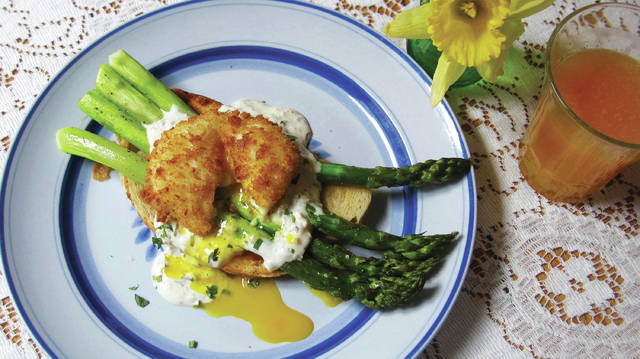Here’s a special dish tailor-made for an elegant spring brunch. It requires slightly more than the usual amount of work, but it’s so worth it. Most of the recipe’s several components can be prepared ahead of time, then reheated and assembled at the last minute.
The base is artisanal toast brushed with olive oil and topped with roasted asparagus. The asparagus can be prepped and pre-roasted, then warmed in the oven before serving. The bearnaise can be prepped just short of stirring in the fresh tarragon and kept covered and chilled until the moment of truth. You can poach your eggs as much as a day ahead.
I have an idiot-proof method for poaching eggs that will change your life if you love eating poached eggs but you’re wary of making them. So if nothing else here grabs you, please pay attention to the poaching.
The only tricky part of this recipe is breading the eggs without breaking the yolks. You need to move slowly and delicately when transporting them. Lift them carefully in and out of the ice water with a large slotted spoon. Coat the poached eggs by gently lifting up the edges of the parchment paper, which causes the eggs to roll over in the flour and bread crumbs. Move the coated eggs into and out of the oil using that slotted spoon (now well-dried). Resist the temptation to turn the eggs in the oil — they’ll brown on both sides without being turned.
I encourage you to coat and deep-fry the eggs for a taste of something ethereal and to put this dish over the top. But if you’re not a fan of deep-frying, poaching the eggs will be enough. Your guests will be delighted anyway.
Roasted Asparagus Toasts with Poached Fried Eggs and Cheating Bernaise
Serves 4
For the asparagus:
16 thick asparagus, trimmed and peeled
1 tablespoon extra-virgin olive oil
Kosher salt and black pepper
4 slices artisanal bread, toasted and brushed with extra-virgin olive oil
For the bearnaise:
¼ cup finely chopped shallot
2 tablespoons white wine vinegar
2 tablespoons dry white wine
2 teaspoons dried tarragon
Kosher salt
4 ounces Neufchatel cheese
¼ cup whole milk
2 teaspoons finely chopped fresh tarragon leaves
Black pepper
For the eggs:
5 large eggs
Vegetable oil for deep-frying
1/4 cup all-purpose flour
1 cup coarse fresh bread crumbs (made by pulsing homemade style white bread in a food processor or blender)
¼ teaspoon kosher salt
Roast the asparagus: Preheat the oven to 425 degrees. On a rimmed sheet pan toss the asparagus with the oil and salt and pepper to taste and roast on a shelf in the top third of the oven until just tender but not browned, about 10 minutes. Remove the pan from the oven and set it aside. Reduce the oven to 350 degrees.
Make the bearnaise: In a small saucepan, combine the shallot, vinegar, wine, dried tarragon and a hefty pinch of salt. Bring the mixture to a boil; reduce the heat to low and simmer 3 to 4 minutes until the liquid has been reduced to about 1 tablespoon. Add the Neufchatel, a tablespoon at a time, and whisk until it has been incorporated. Whisk in the milk, fresh tarragon, and salt and pepper to taste and remove the sauce from the heat while you prepare the eggs.
Prepare the eggs: In a deep, straight-sided skillet, add 2 inches water and bring it to a boil. Break an egg into a fine mesh strainer set over a bowl. Tilt the egg around in the strainer and bang the strainer a few times on top of the bowl to let all the loose egg white fall through the strainer. (This ensures that the poached egg has no straggly white; if you don’t mind straggly whites, skip this step.) Repeat with 3 of the remaining eggs, transferring the drained eggs to individual ramekins or small bowls. Discard the loose whites. When the water has come to a boil, turn off the burner, very gently slide the eggs into the water and cover the pan. Cook the eggs, in the residual heat for 1 1/2 to 2 minutes or until they have reached the desired degree of doneness. Using a slotted spoon carefully transfer the eggs to a bowl of ice and water to cool for 5 minutes and then to a plate lined with paper towels.
Return the asparagus to the oven to reheat it and warm the bearnaise on the stove.
In a large deep saucepan heat 2 inches of oil to 365 degrees. In a shallow bowl, beat the remaining egg with 1 tablespoon water. Spread the flour on a piece of parchment. Spread the bread crumbs on a second piece of parchment and toss with the salt. Working carefully so as not to break the yolk, coat each egg with the flour, dip it in the beaten egg and finally coat it with the crumbs. Working in two batches, gently transfer the breaded eggs with a large slotted spoon to the oil and let them fry for 15 to 20 seconds or until golden. Transfer to a paper towel-lined plate to drain.
To serve: Place a piece of toast on each of 4 plates, top each piece with four stalks of asparagus and spoon some of the bearnaise over the asparagus. Top with an egg and serve right away.



